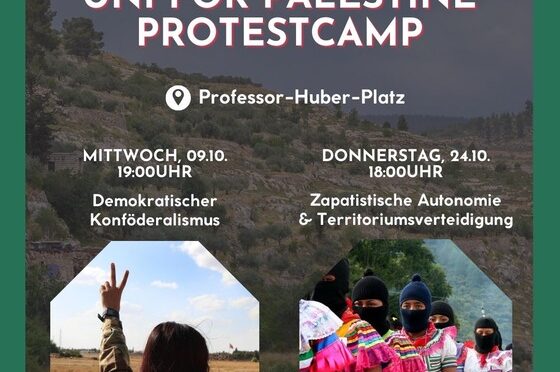Wann
Donnerstag - 24.10.2024
18:00 - 20:30
Wo
Professor-Huber-Platz
Professor-Huber-Platz
München
(english below)
(de)
 Einladung zum Café Global am 24.10.24 um 18 Uhr, dieses Mal am „Uni for Palestine“ Protestcamp am Professor-Huber-Platz.
Einladung zum Café Global am 24.10.24 um 18 Uhr, dieses Mal am „Uni for Palestine“ Protestcamp am Professor-Huber-Platz.
Wir freuen uns den zweiten Teil unserer Veranstaltungsreihe zu „alternativen Gesellschaftsformen“ mit euch auf dem Protestcamp „Uni for Palestine“ zu gestalten. Für Getränke und für Essen können wir leider nicht sorgen, aber bringt gerne was für euch und andere mit zum teilen. Der Input und Diskussion ist auf deutsch, Flüsterübersetzung kann spontan organisiert werden! Das Camp ist barrierearm zugänglich und eine rollstuhlgerechte Toilette ist in der Universität vorhanden.

Wir möchten mit euch über diese besondere Form der Gesellschaftsstruktur diskutieren und darüber sprechen, welche Elemente davon auch in anderen Teilen der Welt umgesetzt werden können, besonders wie sie abseits von Nationen, Staatlichkeit und Herrschaft nach praktischen Lösungen sucht.
In Mexiko gibt es viele verschiedene indigene Gruppen, die den Aufbau und die Verteidigung ihres Wissens, ihrer Beziehung zum Land und untereinander als „Verteidigung des Territoriums“ beschreiben. Auch dieses Konzept möchten wir mit euch diskutieren, denn es birgt viele Möglichkeiten die Beziehung zu Land, Lebewesen und der (eigenen) Kultur wiederherzustellen, auch wenn diese Beziehung durch Krieg, Gewalt und Zerstörung immer wieder erschüttert wurde.
Wir freuen uns auf die Diskussion mit Euch!
___________________________________________________________________________
(EN)

We look forward to organizing the second part of our series of events on „alternative forms of society“ with you at the „Uni for Palestine“ protest camp. Unfortunately we can’t provide food and drinks, but please bring something for you and others to share. The input and discussion will be in German, whispered translation can be organized spontaneously! The camp is barrier-free accessible and a wheelchair-accessible toilet is available at the university.

Hundreds of villages in which different languages are spoken organize themselves as a common basis away from the state. Decisions are made in the village assemblies and then implemented supra-regionally via a kind of council system. In this way, the Zapatistas create a basic framework that is firmly anchored in the pillars of autonomy: education, production, health and a culture of remembrance. This hard-earned autonomy is currently exposed to fierce attacks and violence and must be defended on many different levels.
We would like to discuss with you this particular form of social structure and what elements of it can be implemented in other parts of the world, especially how it seeks practical solutions beyond nations, statehood and domination.
In Mexico, there are many different indigenous groups that describe the construction and defense of their knowledge, their relationship to the land and to each other as „defense of territory“. We would also like to discuss this concept with you, as it holds many possibilities for restoring the relationship with the land, living beings and their (own) culture, even if this relationship has been repeatedly shaken by war, violence and destruction.
We look forward to the discussion with you!
Kategorie
Diese Veranstaltung als iCal exportieren.

